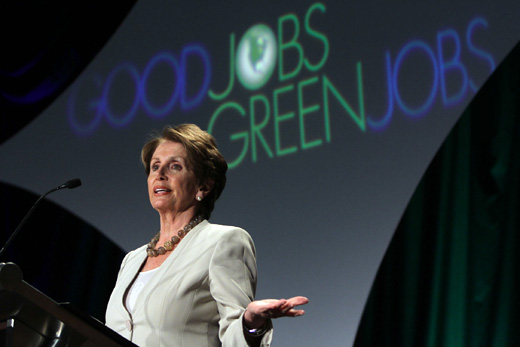
WASHINGTON – Unionists and green groups, seeking to both create well-paying union jobs and improve the environment, are embarking on a “Repair America” campaign they hope will resonate with voters concerned about low incomes, citizens worried about climate change and lawmakers who will respond to pressure on both.
The campaign, discussed at the Good Jobs Green Jobs conference in D.C. on Feb. 9-11, got its congressional kickoff with an indoor Capitol Hill rally jammed with Steelworkers, led by union President Leo Gerard, and lawmakers headed by House Democratic Leader Nancy Pelosi, D-Calif.
Its objective: To convince citizens and Congress to back massive funding for repairing and rebuilding the creaky, crumbling U.S. infrastructure of unsound bridges, leaky water pipes, energy-inefficient schools, homes and hospitals, crumbling highways and rails split by extreme heat and cold.
Unions and greens both face the problem of reaching a wider public that is apathetic or cynical about politics and policy, concerned about jobs, concentrating on kitchen table issues and worried about paying the mortgage, sending kids to college and retiring securely.
Greens have failed to show how their movement could help people achieve those goals. Business, the radical right and its Republican lackeys vilify unions as job destroyers whose members earn too much and whose pensions are too high.
But they have one big positive, Gerard told the packed house in a U.S. Senate hearing room: Strength in numbers. The BlueGreen Alliance, which USW and the Sierra Club co-founded, has unions and greens with 14 million members, combined.
“We’re the ones campaigning for good jobs and to create the jobs of the future,” he said.
To get to those jobs of the future, however, the unions and greens need to concentrate on jobs now, in a time when unemployment is still at 6.6% and the number of long-term jobless remains at or near record highs.
That led to the emphasis on infrastructure, especially “shovel-ready” repairs.
“We have a D+ infrastructure,” Gerard declared, comparing the state of U.S. bridges, roads and railways to India or “a South American country that never invested.
“You can’t have a competitive economy when you have bridges that fall down as you try to get to work, water systems leaking 15% of their contents before they ever get to your kitchen sink, and buildings that lose twice as much heat” as comparable structures in other countries, Gerard stated.
And consumers in West Virginia, hit by leaky toxic chemicals in their water in the Charleston area, “were told they couldn’t turn their water off, because if they took the pressure off, the pipes will collapse.”
Fixing those problems is the point of the repair campaign that unions and greens are launching. Its centerpiece is creation of a National Infrastructure Bank to use public dollars to leverage private investment in such repair and replacement projects. The campaign also emphasizes using the money for “green” repairs that save energy – and create U.S. jobs in everything from high-quality pipe to windmills for electric power.
“If we invested enough money to get to a grade of ‘B’ on infrastructure, we’d have 11 million more jobs and put those Americans back to work,” Gerard declared.
Lawmakers, all Democrats, enthusiastically endorsed the repair campaign. And they added their own demand, which USW drafted with them: Strong language mandating materials for the projects must be U.S.-made.
“It’s as easy as A-B-C,” Pelosi said. “(A) Make it in America, (B) Build the infrastructure of America with products made in America and (C) For community: Corporate America must make decisions that respect all stakeholders” in America, “not just shareholders.”
But unionists and greens face GOP opposition, as usual, Rep. Rosa DeLauro, D-Conn., warned. The foes will say: “There they go again, spending money,” said DeLauro, author of the infrastructure bank bill. “You let them know this is not a partisan issue, but one that involves our long-term prosperity.
“We can develop transportation systems that cut down on carbon usage” and slow global warming, “build more levees to contain floods, construct more energy-efficient smart grids and build public housing, hospitals and schools – and create jobs that cannot be outsourced,” she exclaimed.
Unionists and greens also must take that non-partisan message out on the road, said Dave Foster, a former Steelworkers district director who now heads the BlueGreen Alliance. That’s one reason Gerard, earlier, urged USW Rapid Response conference delegates to recruit enough colleagues to double their numbers. “Imagine the power we’ll have in the statehouses, in the municipalities and here if we were double,” he said. “We want to have a stronger voice to take on these challenges.”
Photo: House Democratic Leader Nancy Pelosi, D-Calif., speaking at the conference. Good Jobs Green Jobs Flickr page.












Comments